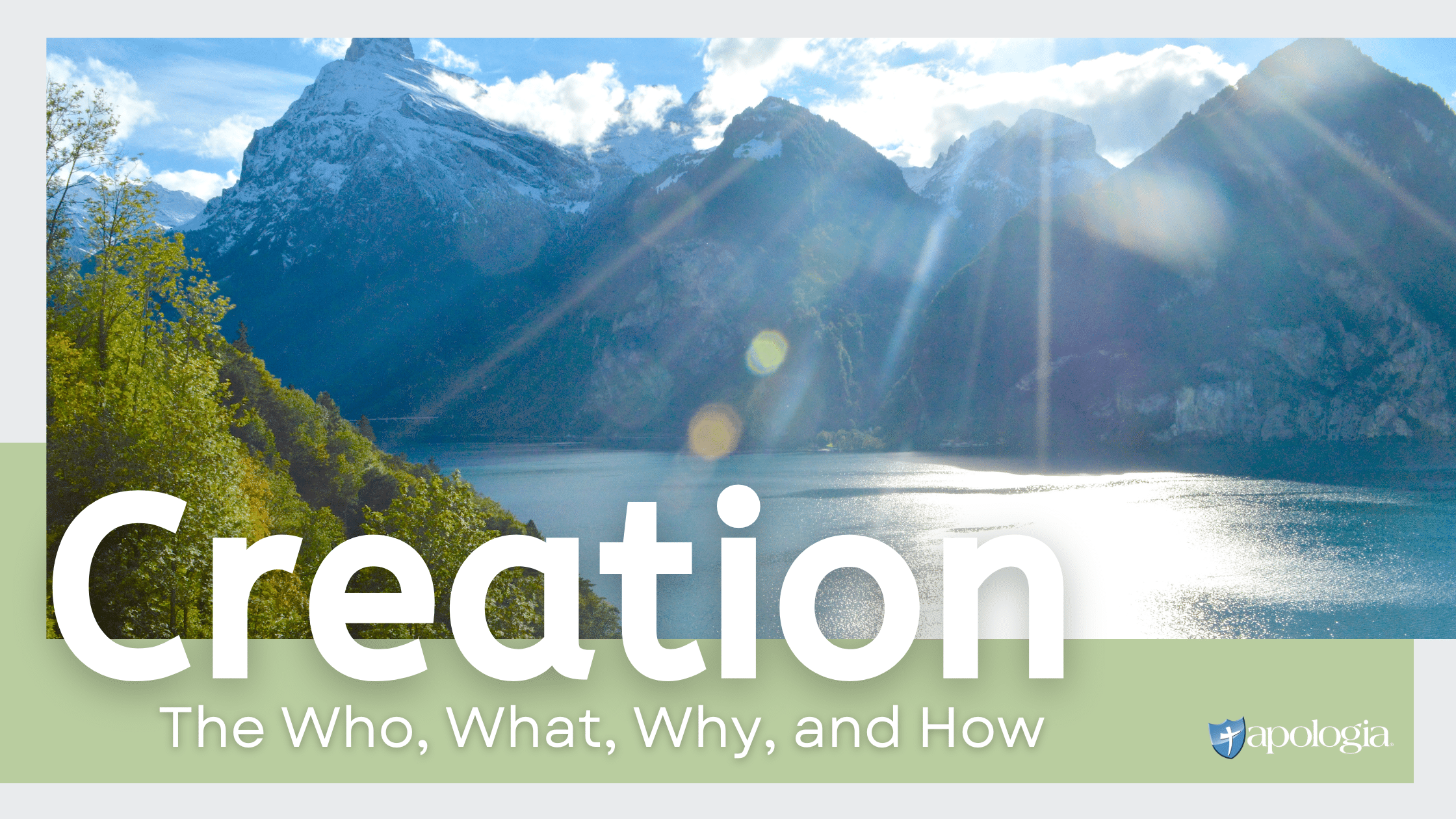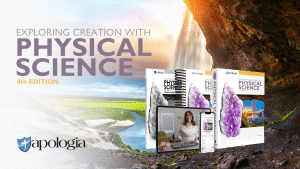
Creation – The Who, What, Why, and How?
For we know that the whole creation has been groaning together in the pains of childbirth until now. And not only the creation, but we ourselves…
— Romans 8:22-23a
The “How”
Apologia publishes creation-based science, math, and Bible curriculum. When you hear the term “creation-based,” what comes to mind? Maybe the first thing that pops into your head is the age of the Earth or the creation-versus-evolution debate. Possibly you think about the evidence for intelligent design or the arguments for and against theistic evolution. If these are the ideas that come to mind, the focus is on how the world was made.
The “how” is an important issue, but there’s more to consider. We should also pay attention to the fact that God created and why God created. What is the purpose of creation, and what is our purpose as central creatures?
The “Why”
An excellent resource on this topic is a book I just read by Edward Klink titled: The Beginning and End of All Things. He argues that “the goal of every Christian is not a departure to an otherworldy ‘heaven’ somewhere in the clouds but a ‘coming down’ of heaven to the earth…and the renewal of all creation.”
God had a reason for creating in the first place. As image bearers, God placed us here to do a very real job — a clear purpose for mankind.
Some theologians have organized God’s Big Story in the simple order of Creation, Fall, Redemption, and Restoration. Klink offers an even simpler outline: Creation, Redemption, and New Creation. Recognizing the basic plot arch of the biblical narrative allows for a holistic understanding of creation―a story that is unfolded throughout the entire Bible (not just in Genesis chapters one, two, and three). From beginning to end, the theme of creation and new creation not only directs the movement of the entire biblical story but also unifies its message. Klink explores the goodness of the physical world and how it will be perfected in the new creation of heaven and earth. Along with offering rich insights about God and his purposes for the world, a biblical theology of creation guides how we engage with nature, culture, and all of life as embodied beings. (I’ll include science, math, and all other academic fields of study.)
One of God’s ultimate goals for creation is that we would have unbroken fellowship with Him—that God would make His dwelling with us, and we would make our dwelling with Him. As we know, this relationship was broken. But God had a plan to restore all things. The redemption of the world and reconciliation of mankind by grace alone through faith in Christ alone is not plan B. It’s God’s original plan.
We are called to participate in God’s renewal of His creation as his ambassadors, saved from the curse of sin and for God’s purposes.
Understanding the full, complete, and big picture of creation can be good food for thought on what it means for anything to be “creation-based.”
I hope that now, when you think of creation, your thoughts turn to more than just how God created, but that He created and why He created. Together, the entire Gospel message (Creation-Redemption-New Creation) starts to make more sense and gives more meaning to life on Earth now and eternal life in Heaven to come.
The “Who” and the “What”
So now, what comes to mind when you hear the phrase “creation-based” curriculum? I believe every subject can and should be written and taught from a biblical worldview. And for what it’s worth, every textbook and teacher has some kind of worldview by default. It’s automatic and expected. This worldview greatly influences how a teacher approaches a given subject, and the worldview embedded within a textbook will greatly affect the perspective and approach by which a student learns.
For example, some Eastern religions perceive the physical world as an illusion believing that the spiritual or unseen is the only thing that is real. The post-Enlightenment Western worldview swings the pendulum the other way placing credibility in the senses and what can be measured. Everything else, in particular the spiritual realm, is either not important or just our imagination.
An atheist would say that our world is merely random chemical, biological, or physical interactions with rules that allow us to understand how it all works. Yet without God—a purposeful creator and designer—an atheistic worldview can’t answer why we have space, time, and matter in the first place. In other words, a biblical worldview (specifically, a creation-based view of science) gives meaning to the chemistry, biology, and physics that we can explore, discover, learn, study, and understand.
Understanding the why of any subject (science, math, language, or history) gives it meaning—and actually makes it more exciting and interesting. Without God Almighty being front and center as the creator of all things, education has no purpose, and studying any subject becomes meaningless.
The Short Answers
When it comes to creation and origins, only a biblical worldview can answer all four questions listed in the title of this article.
Who? God Almighty, maker of heaven and earth.
What? Space, time, and matter. Skies, water, dry land. Sun, moon, stars. Birds, fish, land animals. Mankind—male and female in His image.
How? In six days by the Word of God.
Why? For His glory. So that we can enjoy unbroken fellowship with Him—that God would make His dwelling with us, and we would make our dwelling with Him.
Dominion & Stewardship Over Creation
As a side note, last month, many people celebrated Earth Day. God gave us dominion over His creation. So as a Christian, I love and care for God’s world. But I don’t worship it. And neither should anyone else. When it comes to “saving the planet” and other related topics, we need to have a biblical worldview in order to steward, manage, and care for the skies, waters, plants, fish, birds, and animals without falling into the trap of idolizing creation and missing the one who breathed it all into existence by His Word.
Biblical Worldview in Curriculum
I want to make one more important and final point. The demographics of the homeschool population have changed quite a bit since 2020. Specifically, it’s become more secular. Some estimates say that thirty years ago, two-thirds of homeschooling families identified as Christian. Ten years ago, it may have been closer to fifty-fifty. Since COVID, many new families have entered the world of home education. This is great, but now only about one-third claim the banner of Christianity. Some publishers have decided to pivot and start secular brands. They take God and Scripture out of their textbooks to make them more appealing to the non-Christian market.
I have a completely different vision. Apologia is committed to publishing creation-based science. We will not take God or Scripture out of our resources. And here’s why—I believe homeschooling and using Apologia curricula is a great way for people to be introduced to science and its Creator. I pray that families will use Apologia textbooks because they are excellent science courses that point to the true Creator. As families and students explore creation and understand the science behind it all, I also pray the Gospel story is shared, heard, and believed.
Thanks for being a part of Apologia on this journey.
Creation-Based Resources for Your Homeschool
Exploring Creation with Physical Science, 4th Edition
Now available for pre-order!
Embark on a journey of scientific discovery with Apologia’s middle school physical science homeschool curriculum. Delve into the world of physical science with an engaging textbook, a student notebook to record notes, observations, and experiments, video lessons, an audiobook, and more.
Our homeschool physical science curriculum teaches atomic structure, the periodic table, chemical bonds, reactions, motion, forces, energy, waves, sound, light, electricity, magnetism, Earth’s structure, weather, and atmosphere. Elevate your middle schooler’s understanding of physical science with Apologia’s comprehensive curriculum.


